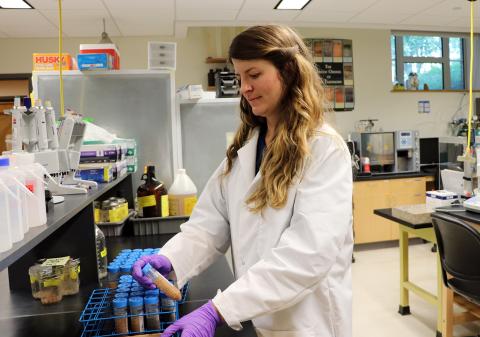
Andrea Jilling will graduate with her doctorate in Earth and Environmental Sciences in September 2019. Her thesis topic is the potential bioavailability and agronomic relevance of mineral-associated organic nitrogen, and her advisor is Stuart Grandy.
Andrea Jilling: I’ll be moving to Stillwater, Oklahoma to start a faculty position at Oklahoma State University in their Department of Plant and Soil Science. In my role as Assistant Professor of Environmental Soil Chemistry, I plan to develop a research and teaching program focused on soil health and fertility.
Jilling: After college, I spent a few years working on farms — first, at a rooftop hydroponic greenhouse in Montreal and then on a 9-acre vegetable farm in southern New Hampshire. While living and working in NH, I felt the draw to go back to school, and started exploring my options. A mentor of mine connected me to Stuart Grandy, suggesting I reach out about openings in his research group. It was immediately clear it would be a great fit. Dr. Grandy’s lab was well known for conducting fundamental research on soil fertility (e.g., the mechanisms that drive soil organic matter formation) while also communicating the practical applications of this work. It was the perfect opportunity to draw on my personal interest in farming and my curiosity and love for science.
Jilling: Soil organic matter is a valuable resource as it provides nutrients for plants and underpins the health and productivity of agricultural systems. Through agricultural management, we can influence the potential for soils to support and maintain a healthy and productive crop. However, the mechanisms that control how and when plants access nutrients within soil organic matter are not fully understood, leading to an over-reliance on fertilizers. In my research, I examine how plants and soil organisms interact to influence the “built-in” supply of nutrients within soils. I aim to bridge fundamental and applied research by studying plant-soil interactions within a broader framework of soil health and sustainable agriculture.
Jilling: Soils clean our water, regulate our climate, and form the basis for the food, fiber and fuel that we rely on every day. I hope that in researching how soils function at a fundamental level that we can better manage for healthy and resilient agricultural systems.
Jilling: My family, friends, and my love for learning.
Jilling: I would likely be running a vegetable and flower farm somewhere in New England. I love how farming requires daily problem-solving and innovating. It also gets you outside all day, every day. Luckily, soil science research is not all that different!
Jilling: I will miss my community of friends and colleagues. My lab, my department, and folks I’ve connected with across campus - they all feel like family to me.
Jilling: I played water polo for many years and can tread water for a silly amount of time.
Learn More